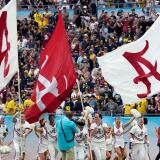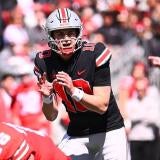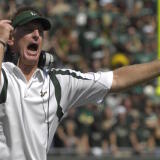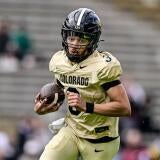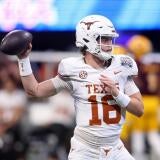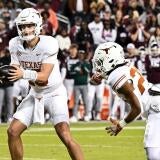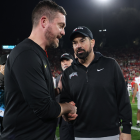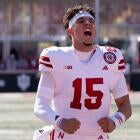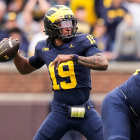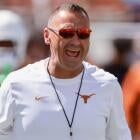In NIL and transfer portal era, top college football stars have more say than ever in building supporting cast
From Nico Iamaleava to Luke Altmyer, the best in the game are making their roster demands known
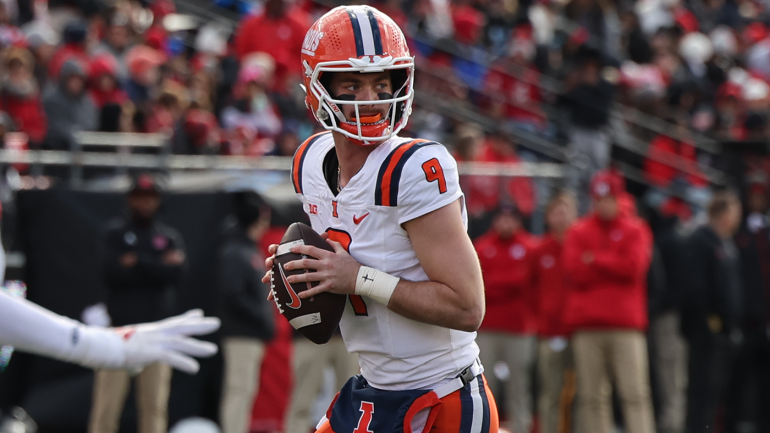
You best know Dylan Stewart as a game-wrecking defensive end who has a chance to end the season as the nation's best defensive player. The 6-foot-5, 245-pound star had 6.5 sacks, 9.5 tackles for loss and 34 quarterback hurries as a true freshman, and he has already drawn comparisons to former Gamecocks star Jadeveon Clowney.
But if Stewart is going to reach his seemingly limitless potential, the kind that former teammate Kyle Kennard says is going to make him "an all-timer in this sport," he knows he needs help.
With rival teams dangling big money to tempt him to leave South Carolina, Stewart wasn't afraid to be forceful in making sure it was an offseason priority for the Gamecocks. During hectic transfer portal periods, Stewart would pop into the office of Darren Uscher, South Carolina's director of player personnel and recruiting, to see who South Carolina was considering adding at the defensive line position. He'd plop down and intently watch as Uscher and his team reviewed film of defensive line recruiting targets.
When Stewart didn't like what he saw, the typically soft-spoken defensive end wasn't shy about expressing his feelings.
"If he doesn't like them, he'll let us know," Uscher told CBS Sports. "'This dude can't play.' He wants good teammates."
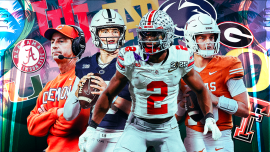
The reasoning is easy to understand, according to Stewart. Even with Kennard -- the eventual Nagurski Award winner as the nation's top defensive player -- opposite him last season, Stewart still faced double teams and even a triple-team against Kentucky. Even for a superstar like Stewart, he admits you can't do much in that scenario.
"If you just send all your people to one person and you can run your game plan, that's easy," Stewart says. "But if you've got two guys, you have to figure it out."
South Carolina, with College Football Playoff hopes as the preseason No. 13 team, listened to Stewart's desires and added four defensive linemen and two edge-rushers out of the transfer portal.
Stewart wanting a hand in the players surrounding him is more normal now than you would think. In the transfer portal and NIL era, where top players earn millions and have more agency than ever, they want a real say in who else is on the roster. We've seen this play out for years at the professional levels, from NFL quarterbacks like Aaron Rodgers to NBA superstars such as LeBron James, who act as unofficial general managers in helping shape the roster.
With the professionalization of college sports, it was only a matter of time before that trickled down.
In fact, one of the reasons for Nico Iamaleava's departure from Tennessee was discomfort over the offensive line and wide receivers that were returning to Knoxville this season. Iamaleava's camp, which included his father Nic and family friend Cordell Landers, wanted Tennessee to be more aggressive in adding players to help the quarterback. After a season that ended in Iamaleava's helmet cracking twice against Ohio State in the College Football Playoff, Iamaleava's advisors wanted a better offensive line to protect him. There was frustration this spring, too, over a wide receivers room that was now without Bru McCoy and Dont'e Thornton Jr.
Of course, that same camp also wanted Tennessee to dramatically increase its compensation for Nico, sources told CBS Sports, a demand that was ultimately rejected.
Iamaleava was slated to make around $2.4 million this season, and after multiple offseason headlines about top quarterbacks such as Miami's Carson Beck and Duke's Darian Mensah significantly eclipsing that number, the people around the Tennessee quarterback believed he deserved more. It has been previously reported they wanted something in the $4 million range, though Darren Heitner, a prominent sports law attorney who had conversations with Iamaleava's camp during the saga, believes the ask was actually $6-$8 million. Sources believe Tennessee was willing to go to the low $3 million range but was never going to come close to those outlandish asks.
Iamaleava's camp was confident he'd be able to make more than $4 million on the open market, though leaving Tennessee in the spring significantly limited the pool of potential suitors and drove his value down. Iamaleava ultimately left for UCLA and is expected to make less this season in Los Angeles than he would have had he stayed in Knoxville. Those around Iamaleava have always denied it was about the money -- sources around Tennessee, of course, say otherwise -- and that it was about the surrounding talent. Iamaleava, in his first public comments back in July, told CBS Sports, "My family was strictly the main importance for me. I let my business team, my parents, handle that side of NIL. Just me being closer to family was the most important thing."
While Iamaleava has become the poster child for NIL gone bad in some ways, his non-financial demands made sense.
"All the great college quarterbacks we've seen in the past, they've all had a great supporting cast," Indiana quarterback Fernando Mendoza told CBS Sports. "Although there is a lot of imagery and attention put on the quarterback, it's not a one-man show. It really is an 11-person game."
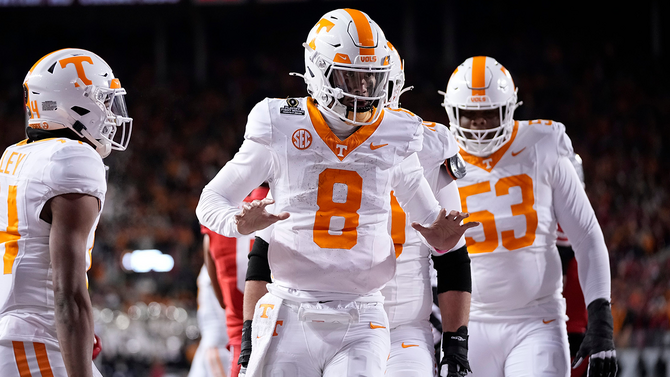
In a weird twist of fate, one of the quarterbacks Tennessee was interested in adding to replace Iamaleava had gone through a similar exercise himself months earlier.
Multiple schools, including some within the SEC, were interested in poaching Luke Altmyer away from Illinois. The Mississippi native had started his career at Ole Miss, so he was familiar with the SEC and was coming off his best season yet in guiding the Fighting Illini to a 10-3 record. He threw for 2,717 yards, 22 touchdowns and only six interceptions.
As Altmyer weighed his options, he had three questions for Illinois coach Bret Bielema: 1) Was offensive coordinator Barry Lunney Jr. coming back? 2) What role would Art Sitkowski have in 2025? 3) Who would be the offensive line and wide receivers for him in 2025?
The receiver position was a huge question after Illinois lost its top two receivers, Pat Bryant and Zakhari Franklin, from last year's team. Bryant, in particular, had a significant impact on the program and was responsible for three game-winning touchdowns.
Altmyer's questions didn't offend Bielema. After stints with the New York Giants and New England Patriots before coming to Illinois, he thinks his senior quarterback is ahead of the curve.
"A good quarterback knows he is built by the protection in front of him and the talent that he has around him," Bielema says. "...That verifies even further to me how well he thinks. He's a college player who plays like an NFL player the way he thinks, the way he prepares."
Altmyer says he was heavily involved in their recent recruiting of receivers, from meeting with players on their visits to sending posts to general manager Pat Embleton to make sure Illinois is involved with players he thinks they need. If he was going to stay at Illinois, a place he truly believes can compete at the highest level this season, he wanted to make sure he was doing everything he could to make that happen.
Given the importance of the quarterback position, having Altmyer actively involved was critical for Illinois this offseason. Coming off a terrific 2024 season and with hope building for what could be accomplished in 2025, Illinois knew it had to do whatever it could to keep Altmyer happy. Illinois ultimately added West Virginia transfer Hudson Clement and Ball State transfer Justin Bowick, both of whom are expected to be contributors at receiver this season.
"They know that I have a different perspective being the quarterback out there making the plays and on the field," Altmyer says. "So I'm heavily involved through the social media world, and they're sending me player tapes and being in some of those meetings like, 'Hey, what do you think about this guy compared to this guy?' It's crazy, but it's a lot of fun."
Not every player has the cachet to want or be given a say in shaping the roster, but it is one advantage schools can deploy to keep their star players on the roster. Player acquisition gets the most attention in college football now, but player retention is even more important, especially for programs focused on developing homegrown talent. Money will always be critical, but knowing your voice is important enough to impact what your program wants to do in its roster-building could be the tipping point in staying. It could ultimately save programs money, too, keeping players on relatively team-friendly deals versus having to fill critical positions through free agency where demands are high and discounts are practically nonexistent.
For Altmyer, having a say on his teammates for his final season was a reason why he knew Champaign was where he needed to be in 2025.
"There's a big risk in picking up and going somewhere that's uncertain to a team that needs a quarterback and doesn't have a lot of good players around around him," Altmyer says. "I'm comfortable here because I know what's around me, I know the trajectory, I know the people around me, and I know where we can go."

